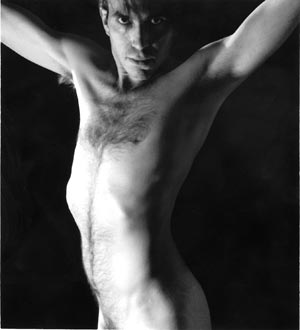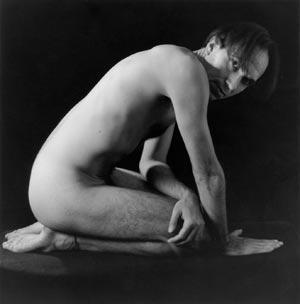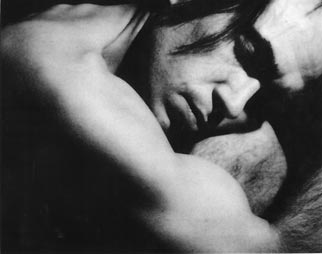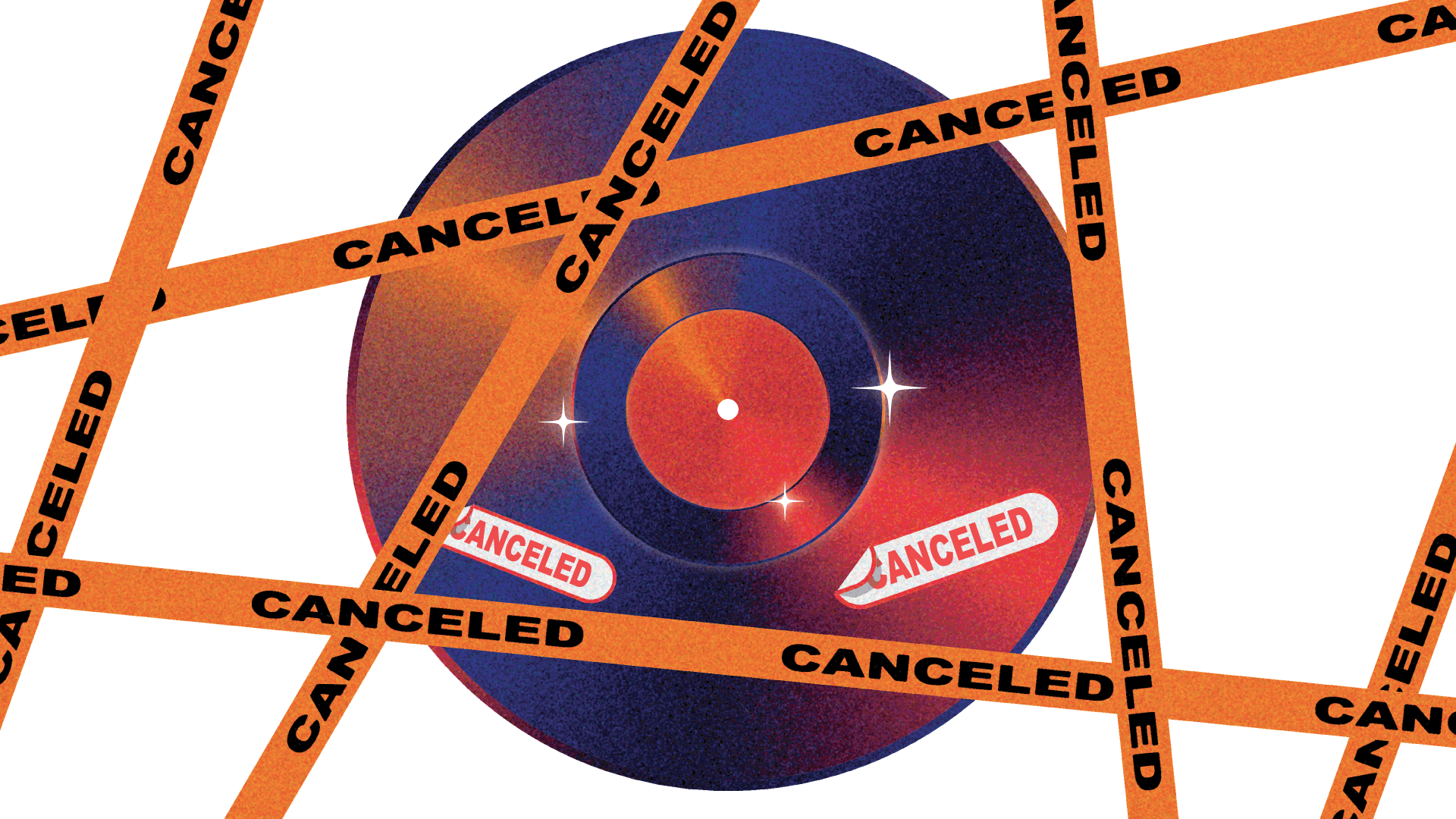Profile of Writer and Figure Model Paul McComas
By Dimitry Tetin
Paul McComas is a lot more imposing up close than behind the protective shield of a drawing easel. Drawings of him often line the school walls: Paul comfortably sleeping, Paul standing on one foot, Paul stretching out his arms like an Ancient Egyptian priest waiting for the appearance of Ra. On the surface of brown butcher paper the image of his body suffers daily from terrible distortions: the top of his skull is severed, his legs are extended to three quarters of the body, new joints are created for him, while the ones he has are ossified.
“I am this body and this body seems to know what it’s doing,” Dayna Clay, the character of McComas’ first novel Unplugged, says to herself. “I am this body” is a phrase that opens many of Dayna’s lines. Unplugged describes the journey of a twenty-something rock star, completely unable to handle her stardom. Her depression becomes obvious at the beginning of Unplugged and McComas hints early at the subtext of his heroine’s childhood abuse. Leaving her stardom behind, she retreats away from everything, to the barren landscape of the Badlands, in an attempt to let her body guide her to the recovery of her self.
“It was April, 1997, while driving, I heard the news of Kurt Cobain’s death. I had to stop my car,” McComas remembers. The event that brought the end to Generation X helped bring to the forefront McComas’ talent a writer. In his twenties he was a self-described “jack of all trades.” He dabbled in music, performance, fiction, writing screenplays, and modern dance. In many ways, he was a prototypical “creative.” McComas worked in public relations and as a journalist, moonlighting on several political campaigns. In college he wrote stories that directly addressed political issues. He soon found that politics began to overshadow his characters. In response to his mentor’s suggestion to “write what you know,” he started to develop a way of writing that directly focused on the character, while allowing “plenty of opportunity for socio-political commentary.
“If you create engaging characters and place them in a setting appropriate to exploring your theme, the plot is, quite simply, whatever happens,” Paul stresses to students in the fiction classes he teaches. This character-driven approach allowed him to write a 250-page novel exclusively from a female point of view.
Stressing that he is not a fan of identity politics, McComas wholeheartedly rejects the male-female dichotomy: “Sexual differences are dwarfed by individual personalities.” The feeling comes through in the main character of Unplugged. Through a masterful act of portraiture, McComas never lets the reader forget that Dayna is a bisexual woman, while allowing her character to dominate the novel by her humanity and universal struggle to recover her damaged spirit. And although the sexual abuse she suffered in her childhood is unique to development as a young women, her actions as an adult are universal to anyone recovering from severe depression.
Dayna Clay’s character is closely related to Kurt Cobain’s androgynous persona and his continuous insistence on addressing the abuse of gays and women. It was while organizing the first of several tribute concerts to Kurt Cobain, “Rock Against Depression,” to educate teens about suicide prevention, symptoms of depression, and treatment options, that McComas “basically collapsed.” The symptoms were clear: insomnia, sorrow, inability to make the simplest decisions, fear without reason. McComas calls the event the “transformative experience of my life.” He says, “Any major crisis affords one an opportunity to gain a new perspective, to reorder one’s life.” Following the recovery, McComas, who was working full time in public relations, decided not to “reinject myself into that particular rat race.” He took writing that was, at the time, his hobby and made the decision to make it a career.
When asked about recovery from depression McComas likes to quote Unplugged character Dayna, who says: “Fewer things matter and they matter much more,” in response to a reporter’s question about what changed in her life after living through depression. “I always make it a point of taking issue with the romantic notion that suffering and genius are inseparable,” McComas says.
He needed to be in a brighter place before starting Unplugged. Its darker chapters, detailing Dayna’s depression and childhood abuse, could not be written by somebody who did not go through similar experiences and come out healthier on the other side.
In order to better understand Dayna’s character, McComas went as far as recording an entire record of original material “in the voice of Dayna Clay.” Proceeds from the sale of the disk benefit two charities: Rape, Abuse and Incest National Network and the Badlands Natural History Association. McComas took the songs on tour of the country, combining them with excerpts from his novel into his performances.
Performance is a large part of McComas’s artistic vocabulary. He regularly performs parts of his written work. It allows him a chance to gauge an audience’s response to his writing in a short period of time. And he “likes the attention.” Recently, as part of “Vaudeville Underground” in Logan Square, McComas provided live accompaniment to the screening of two Super-8 horror movies he made as a teenager.
Performance also enters his work as a figure model at SAIC, Harper College and College of Lake County. Whether dressed as a cowboy and strumming a guitar for Mary Lou Zelazny’s Figure Drawing class or embracing a pillow under the hot lights, as Marion Kryczka marches around the room attempting to keep figurative distortion in his students’ drawings under control, McComas sees the practice of figure drawing as a collaborative process between the student and the model. He talks about observing a student in a Figure Sculpture class, who was clarifying the form by slicing away the extraneous clay, and finding a similarity to the way he chisels away at the superflous narrative to bring forth the characters in his work.
“In my opinion, every figurative artist should do a stint as a figure model,” McComas says. In some ways, the act of figure drawing involves projection of the self upon the model, and the experience of “walking in model’s shoes” can help open new perspectives for the artist. For him, modeling is a way to stay visible and be political. “Current culture wants to cover the body up,” and for McComas the body and spirit are not separate. He states, “Physicality should not be a cause for distress, but a celebration.” This statement strongly echoes Dayna’s recovery from depression by retreating to the basic needs of her physical body. McComas himself dedicates Unplugged to the “beauty of the earth,” and the novel’s most cathartic moment comes as Dayna clings on to the very essence of her body as she is close to death on one of the mountains in the Badlands.
Unplugged was the first novel McComas wrote. It was published in 2002 and stands as a personal contemplation as well as a timely reflection on youth culture in the post-Grunge world. His 1998 collection of short stories, titled Twenty Questions, offers a much harder-edged commentary on what it means to be a heterosexual male in the nineties. Hearts are broken, egos are bruised and redemption is nowhere in sight. However, the characters of each story shine through. They are fucked up, human and insatiable in their quest for something: pleasure, death, feeling alive. It is a satisfying to look at McComas’ progression from Twenty Questions to Unplugged to First Person Imperfect, a collection of short stories that came out of his Minicourse Program at Northwestern University. Some of his recent short stories are included among those of his students, and they are full of humor and vitality, ridiculing some of the darker aspects that characterize his earlier Twenty Questions.
His most recent novel, set in the summer of 1980, juxtaposes the transition of a 16-year-old from a boy to a young man with a country that is moving toward a culture ruled by greed. The main character is overwhelmed by his choices: from his first pathetic attempt to find a girlfriend and struggle to develop a romantic relationship, to his greedy search for new
sexual conquests.
Listening to L.A.’s the “X” will provide a perfect soundtrack to McComas’ new novel. Much like the “X,” McComas is painfully honest. In the 1980s, the era of Ùber-polished production and glamour, the “X” sang about their beds: places they made love in, spent most of their days in, did their drugs in. “What’s wrong with me?” was the question John Doe and Exene asked as Reagan’s war planes flew over their heads.
Like the “X,” McComas has nothing to hide: see him naked, if you like, or read his intensely personal novel or short stories. He is not afraid to experiment and no longer willing to compromise. This position gives him enormous strength: away from his twenty’s state of a cog in the machine. For now, he is completely free.
Additional research by Emile Ferris.
For more information on Paul McComas see:
www.paulmccomas.com
See Paul McComs perform on Dec.1&2 at Vaudeville Underground in Logan Square 2640 W. Altgeld
December 2004























